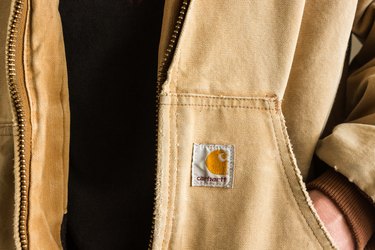
Carhartt jackets are one of the most popular work jackets, especially among people who work outside in the elements. Heavy, durable, and warm, Carhartt jackets provide plenty of comfort and protection in any weather. Carhartts are made out of a heavy cotton canvas material, which makes them stiff and uncomfortable until they are worn or broken in. A shortcut to break in your Carhartt jacket is to soften it before use, resulting in a much more comfortable fit. It takes some extra time to soften your jacket, but it is well worth the effort.
Tip
If you plan to soften your Carhartt jacket, consider buying it one size bigger than your usual size. Because the canvas outer material is made of pure cotton, it can shrink while washing. Buying a larger size will ensure that your jacket is nice and cozy when you're done softening it.
Video of the Day
Things You'll Need
Carhartt jacket
Washing machine
Dryer
White vinegar
Tennis ball
1. Place jacket in washing machine
To start breaking in Carhartt jackets, start by closing all hooks, zippers, and snaps so that they don't get caught in your appliances, which could damage the jacket. Place the jacket in the washing machine by itself and set the washer to the smallest capacity setting. The material in your jacket can shrink, so turn your water settings to cold wash and cold rinse and allow your washing machine to fill up with water. Don't add detergent, bleach, hydrogen peroxide, or any type of softener or starch.
Video of the Day
2. Add vinegar and soak

Pour one cup of plain white vinegar into the water and allow the machine to run until it gets to the agitation cycle. Let the agitator run, then stop the machine before it drains and allow the jacket to soak in the vinegar and water mixture for one to two hours. The vinegar will help soften up the fibers in the jacket without damaging the fire-resistant properties of the material.
Warning
Don’t use any chemical softeners on your Carhartt. The canvas is treated with a special fire-resistant compound, and chemical softeners will ruin the coating. Stick to white vinegar only.
3. Rinse and remove jacket
Restart the washer and allow it to complete the rinse cycle. Run an extra rinse cycle if you can smell any remaining traces of vinegar in the fabric. Do not add any detergent, bleach, or fabric softener as this can alter the properties of the canvas in the jacket. After the rinse cycle, allow the water to drain and remove the jacket. Do not allow it to go through the spin cycle — that could damage the jacket.
4. Dry the jacket
Move your jacket to the dryer, turn it on a low-heat fluff cycle, and run it until it's dry to the touch, checking it every half an hour or so.
If you are concerned about your jacket shrinking, hang it up to air dry in a well-ventilated area protected from harsh weather, like in a garage, laundry room, or covered porch. Allow the jacket to dry completely before putting it on to prevent it from drying in an unusual shape — this will take at least a few hours.
5. Add a tennis ball to the mix

Put your jacket on to evaluate its softness. If it is still too stiff, place the jacket in the dryer with a clean tennis ball and run it through a full cycle. The jacket will not shrink because it is already fully dry, and the tennis ball will bounce around during the cycle, repeatedly hitting the stiff threads of the canvas, which will make the jacket soft and pliable. Repeat this step as needed until the desired softness is achieved.
6. Iron on low heat
Once you're satisfied with the softness of your Carhartt jacket, it's time to get it ready to wear. Iron the jacket on low heat, removing any harsh lines and bumps. While this step is optional, it makes a big difference in how the jacket fits, looks, and feels.